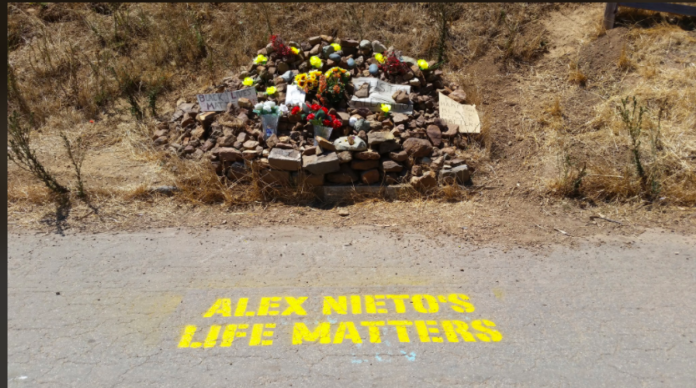
For the first time in history, San Francisco will soon have a permanent monument to a person of color killed by the police.
I was up on Bernal Hill the other day and saw what it turned out was a meeting of the committee that’s putting the design together for the Alex Nieto memorial.
Nieto was shot and killed by the SFPD in 2014. The cops who killed him got away with it. They are still on the force. One of them killed another person. It was a terrible miscarriage of justice.
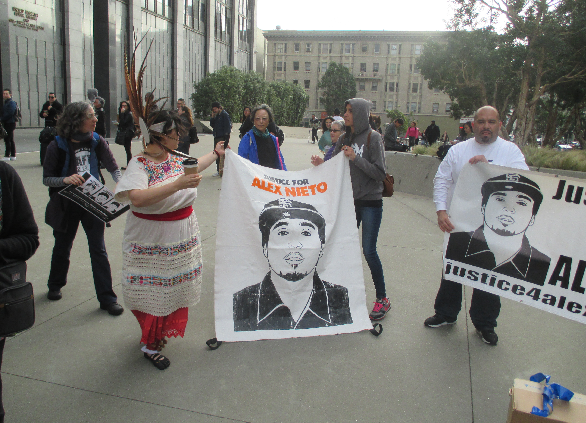
When the family sued, I covered almost every day of the trial. It was abundantly clear that the officers should never have shot and killed the young man.
Former Sup. David Campos worked with community leaders, including City College teacher Benjamin Bac Sierra, in the early days to push the city to allow a permanent monument. After Campos left office, Sup. Hillary Ronen took over that campaign.
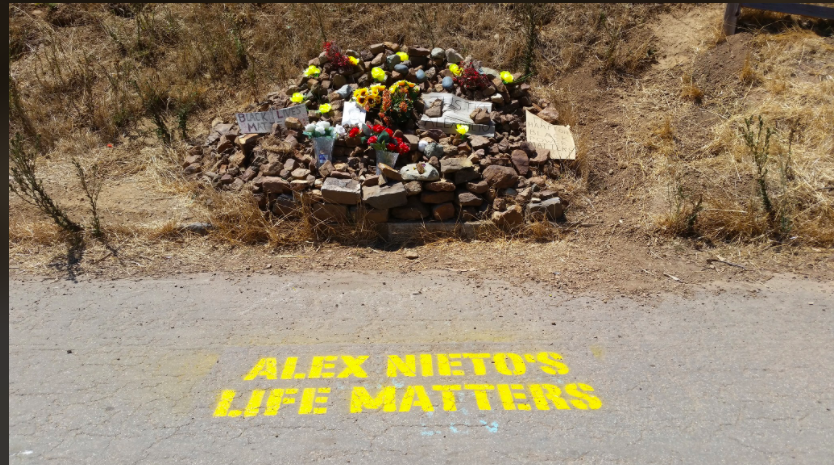
And now it’s been approved and, according to Bac Sierra, the monument should be in place on the hillside where Nieto was killed by mid-September.
The Rec-Park folks, the architect, the contractor – all were up on the hill for the meeting. Bac Sierra said that the ball was rolling – and it’s time to roll it down the hill and into the spot where there has been a temporary memorial that will now become permanent.
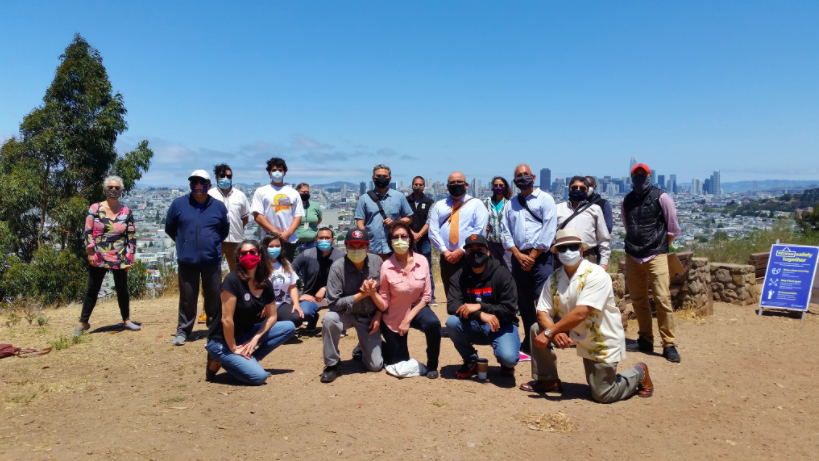
It will be a reminder to everyone who passes by about the tragic consequences of systemic racism in policing, in the need for massive reforms in the SFPD, and the need to hold officers who kill without justification accountable.
And it’s fitting, as activists around the nation are tearing down monuments and statues that glorify racism, that San Francisco can raise a statue to someone who was murdered by the cops.
The Board of Supes and the mayor are close to an agreement on new business taxes, and it’s likely that some sort of a deal will be hammered out this week. At that point, both of the measures currently on the ballot – one from the mayor and one from the board — would be pulled and replaced with a consensus plan.
The sticking point, all sides agree, is how much new revenue the measure should bring in. The mayor’s plan was revenue-neutral – that is, the city would shift the way it collects taxes, but in the end, the business community would pay the same amount. The supes wanted to bring in another $150 million, much of it from the tech industry, which has been radically undertaxed for at least a decade in San Francisco.
The Examiner reports that the current negotiations involve a net increase of $100 million. The supes bill would exempt small businesses with less than $2 million in gross receipts but significantly raise taxes on the bigger tech companies.
Just for context here: In just the past four months, the roughly 600 billionaires in the United States saw their wealth increase by 24.2 percent, according to Americans for Tax Justice. That’s $713 billion – just since the start of the Pandemic.
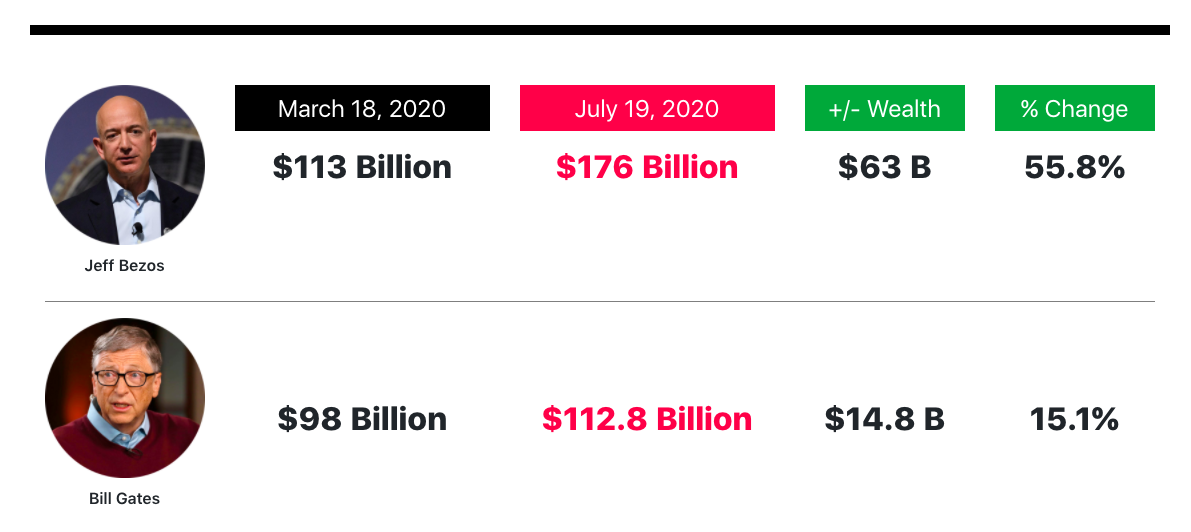
The 15 richest Americans – just 15 – saw their net wealth go from a total of $781 billion to $1.03 trillion during the pandemic. That’s an average of almost 33 percent. Ten of the 15 made their money either in tech or retail (Wal-Mart).
San Francisco alone has 75 billionaires, many of them tech moguls.
Taxing the tech industry just a bit more to save jobs and services in San Francisco shouldn’t be even remotely controversial.
There’s a cool interactive chart here, by the way, of all the billionaires by state.
Tuesday/21 is the day of reckoning for several key reform measures that will be before the board. The move to create a public advocate has five co-sponsors – Sups. Gordon Mar, Hillary Ronen, Dean Preston, Shamann Walton and Matt Haney. One more vote would put it on the ballot – but others in the progressive camp, including Sups. Aaron Peskin and Sandra Lee Fewer, have not taken a public position.
The cost of creating a new office that would take on public corruption from an independent perspective would be less than $1 million.
The other measures, to split up the Department of Public Works and put it under a commission, to remove the minimum police staffing from the City Charter, and to create an independent Sheriff’s Department Oversight Board – all at this point have six votes.
Sup. Ronen is asking the Land Use and Transportation Committee to consider an ordinance that has been in the works for months: A plan to ban office uses in Urban Mixed-Use districts – which includes much of the Eastern Neighborhoods and the Mission.
The idea is that offices – typically in the Mission tech offices – can pay higher rents and drive out other neighborhood-serving businesses (and in some cases, residents).
That comes up Monday/20. It may not seem that important right now, in the middle of a pandemic – but at some point, as the public-health crisis eases, small local businesses are going to need to find space to operate again. And the advantage of banning office use is that it effectively drives down commercial rents.
That’s what community-servicing businesses are going to need in the next couple of years.
The Rules Committee will consider Monday/20 a measure that would undo part of an old, racist rule designed to prevent public housing in California cities.
Article 34 of the state Constitution bans cities from building public housing unless there’s a vote of the people. It was designed to keep low-income people, particularly Black people, out of predominantly white neighborhoods.
It’s still in effect today.
Sup. Dean Preston wants to put a measure on the fall ballot allowing the city to buy, develop, or rehabilitate up to 10,000 units of social housing. If the measure passes, the city would be able to get back in the business of creating low-income housing – something that at this point has been left largely to community-based nonprofits.
Preston has worked with the nonprofit housers, who aren’t opposing this; he just argues that the city should have every possible tool to build affordable housing.
The committee will also hear a measure by Sup. Gordon Mar to require employers to provide emergency medical leave during a public-health crisis.
All of this flurry of activity is happening because the deadline is approaching to put items on the fall ballot – and given the profound importance of the presidential election, it’s likely this will be a very high-turnout ballot. So progressive measures will probably do well.
This board has a big agenda, and it’s going to be a big local ballot.

